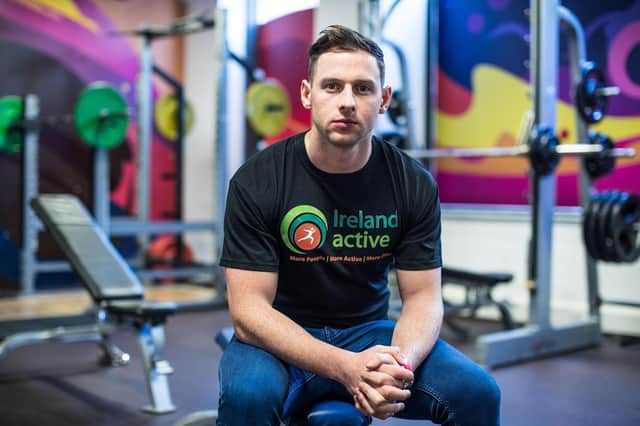DERRY GAA: 'Our Choice'


Many people claim to do their best thinking when walking. Steve Jobs was famous for walking meetings and Facebook founder, Mark Zuckerberg has also been known to adopt the practice.
Wednesday 22 February started out no different to the previous editions of ‘Oakleafers’. A walk along the river and across the Lagan Weir footbridge to High Street was accompanied by memories of previous Derry versus Dublin encounters. Passing Custom House Square was followed by thoughts on Rory Gallagher’s strategy whilst strolling through Cornmarket. Then onto Queen’s Arcade towards a sandwich to go at Sawer’s on College Street.
Advertisement
Hide AdAdvertisement
Hide AdTurning north onto Queen Street, as I looked to check a fixture date on my phone about half way along the distance to Castle Street, the care-free creative process was obliterated.
‘Maria, before heroin and multi drug cocktail abuse took its hold on her. RIP’ read a tweet featuring a picture of a young woman. ‘Many of you would have seen her sitting on castle street or side doors of Castle Court (St. Mary’s) with a colouring book’.
The replies were haunting, containing references to the streets immediately all around.
“Did this girl sit between the fruit shop and butchers on Castle Street? I used to see her all the time, if it’s the same girl she liked to draw. Bless her.”
Advertisement
Hide AdAdvertisement
Hide AdCrossing Castle Street, Bank Square came into view with St. Mary’s Chapel at its head.
“My wife talked about her all the time.”
“That could be our daughter.”
“We saw her often sitting across from the Havana restaurant.”
Maria Brady was 25 years old when she died on 16 February, 2023. She found herself homeless following a terrible battle with drugs during her teenage years. Her funeral service was at 4pm on that Wednesday afternoon in St. Peter’s Cathedral, half a mile from the bottom of Castle Street.
The previous evening at Owenbeg, teenagers from a Derry ladies football squad stood chatting in groups in the foyer, before getting their photos taken for social media promotion. The entire 48-acre site hummed with people and activity. Derry senior footballers had just finished training and mingled with Derry minor and U20 footballers. Derry senior hurlers were still on the main pitch whilst Derry minor camogs were put through their paces on the 4G pitch. Representatives from all Derry clubs met to vote on Central Council options for underage grades for 2023. It seemed important to all those who attended. In hindsight it’s not.
Advertisement
Hide AdAdvertisement
Hide AdThe GAA, LGFA and Camogie Associations aren’t everything in life. There are more important things. Yet, collectively they provide some outlet, some escapism, some structure for young people in Ireland. It’s something in a country that doesn’t always get things right. For Philly McMahon, the GAA was exactly that outlet following the death of his brother, John, in 2012 at 31 years of age following a battle with addiction. It is a story of hope, told in his epic memoir ‘The Choice’.
Holder of eight All-Ireland medals and a mainstay on the greatest Gaelic football team of all time, the Ballymun man is one of the most articulate voices in Ireland on both Gaelic football and societal issues. In an interview with ‘Dublin Live’ last September, McMahon revealed:
“Every time I walk down the street and I see a homeless person it triggers me because my brother was homeless at one point when he was going through his addiction.
“When I was playing for Dublin we would have gone in to feed the homeless, but nobody would have seen it on social media because we did it for the right reasons. We did it to connect, stay grounded and to give energy to people who are struggling. For me, it is close to home.”
After his brother’s death, Philly McMahon is on record about how it changed his attitude to his sport. He threw himself into it, deeper and more intensely than before.
Advertisement
Hide AdAdvertisement
Hide Ad“I’m trying to live his legacy. John shaped me to who I am today. People often ask me how I started to play football and it was because of him,” he said.
“John was an amazing person,” Philly told The Nicky Byrne Show on 2FM, “Not a lot of people or society sees that about drug addicts. They don’t see it that it’s someone’s brother, someone’s son. All they see is this person who is lower than me because they’re on drugs. It’s a stigma that needs to change.”
One local organisation doing just that is the Foyle Haven Centre on John Street, one mile from Celtic Park in Derry. It supports adults who are experiencing homelessness, addiction, poor mental health or social isolation.
During the last decade the GAA has established a Health and Wellbeing Department with associated committees rolled out. Brave people like Oisin McConville have told their stories, warts and all, pushing awareness of addiction processes forward. It is unrealistic to expect GAA volunteers to do the role of health agencies but we can be a beacon for a more caring, understanding society in Ireland.
Advertisement
Hide AdAdvertisement
Hide Ad“RIP Maria. A couple of years ago, My daughter who was 13 at the time, came home and told me how she met a young girl in town and sat talking with her and bought her a sandwich and a drink. Every time after this she would sit and talk with her. We all need to have more empathy,” read another reply to the tweet.
Philly McMahon is right. It should trigger us. It should trigger us at the very least to be curious. Being curious is the core of empathy and having empathy is something that research shows makes us all better team members, coaches, family members or friends.
We can all do better.